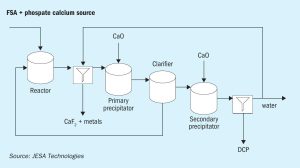
Chinese phosphate exports
Although China remains the world’s largest phosphate producer, it has been overtaken as the largest exporter by Morocco in recent years as domestic producers face continuing restrictions on exports.

Although China remains the world’s largest phosphate producer, it has been overtaken as the largest exporter by Morocco in recent years as domestic producers face continuing restrictions on exports.

Chile’s environmental regulator SMA has filed a charge against state-owned Codelco, alleging emission violations at its Potrerillos copper smelter in the Atacama region of northern Chile. An audit showed the company had not implemented a monitoring system for sulphur dioxide emissions and other procedures in accordance with environmental standards for the plant, Reuters news agency reported. The SMA labelled the charge as serious, which could lead to a fine of around $4.1 million, and possible revocation of the environmental permit or closure. Codelco had ten days to submit a compliance plan, and 15 days to present a defence.
Join us at the CRU Sulphur + Sulphuric Acid 2024 Conference and Exhibition in Barcelona, 4-6 November, for a global gathering of the sulphur and sulphuric acid community. Meet leading market and technology experts and producers, network, share knowledge, and learn about market trends and the latest developments in operations, process technology and equipment.

As more focus extends to a circular economy, there are industry wide discussions on whether future global sulphur demand will be challenged by the energy transition and decarbonisation. Hannes Storch, Collin Bartlett and Marcus Runkel of Metso discuss how the recycling of pyrite tailings could address some of these issues.

In this case study, CS Combustion Solutions presents a comprehensive strategy for the capacity enhancement and optimisation of a sulphuric acid plant that was facing several operational challenges.
Veolia says that its subsidiary Veolia North America has signed an agreement for the divestment of Veolia North America Regeneration Services, which includes its sulphuric acid and hydrofluoric acid regeneration activities for refineries, to private equity firm American Industrial Partners for $620 million. These activities represented revenues of around $350 million in 2023. The financial closure of the transaction is expected soon. Veolia’s Sulphuric Acid Regeneration Business includes its sulphuric acid and potassium hydroxide regeneration, as well as sulphur gas recovery, and sulphur-based products production businesses.

China’s acid production continues to grow as new smelters come on-stream. But high domestic demand from phosphate production as export restrictions are lifted and a shortage of copper concentrate may limit the potential for acid exports.

We profile leading suppliers of tailor-made pumps to the phosphate, potash and sulphur industries.

The newly-patented SWIFT process is designed to sequester fluorine at phosphoric acid plants in an environmentally responsible way. It can also offset the costs of fluorine management by generating a saleable dicalcium phosphate (DCP) end-product as an additional revenue stream. A number of capex and opex advantages provide the SWIFT process with highly favourable economics, as James Byrd of JESA Technologies explains.

How does an engineering company complete the basic and detailed engineering for a phosphoric acid plant – and provide the full design for the off-site sections and utilities? Jan Tytgat, De Smet Agro’s Process Engineering Manager, explains an approach based on partnership with the technology licensor and client that combines engineering expertise with experience.